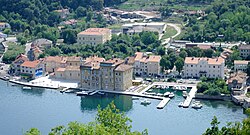Bakar
| Bakar | ||
|---|---|---|
| Town | ||

Bakar seafront
|
||
|
||
| Location of Bakar in Croatia | ||
| Coordinates: 45°19′N 14°32′E / 45.317°N 14.533°E | ||
| Country |
|
|
| County |
|
|
| Settled | 1st century | |
| Named the city Bakar for the first time | 1288 | |
| Declared a free city | May 13, 1798 | |
| Acquired the status of Royal Borough | April 23, 1799 | |
| Government | ||
| • Mayor | Tomislav Klarić (HDZ) | |
| Population (2011) | ||
| • Total | 8,279 | |
| Time zone | CET (UTC+1) | |
| • Summer (DST) | CEST (UTC+2) | |
| Postal code | 51222 | |
| Area code(s) | 051 | |
| Vehicle registration | RI | |
| Website | bakar.hr | |
Bakar (Italian: Buccari, Hungarian: Szádrév) is a town in the Primorje-Gorski Kotar County in western Croatia. The population of the town was 8,279 according to the 2011 Croatian census, including 1,473 in the titular settlement. Ninety percent of the population declared themselves Croats by ethnicity. The largest ethnic minority are the Serbs with 2.91% of the population. The old part of Bakar is situated on a hill overlooking the Bay of Bakar. "Bakar" is the Croatian word for copper.
Bakar is a port for bulk cargo and used to be known for its industrial complex that included coke factory which produced considerable amount of pollution. Bakar's coke factory was closed in 1995 and the area's pollution has subsided significantly.
Bakar was granted its coat of arms and town privileges in 1799 by Empress Maria Theresa. The coat of arms was in the artistic style typical for the period, with a cartouche with large landscapes and ornamentation around the shield within a circular inscription.
The shield of the coat of arms features a red-and-white checkered top or "chief", with three local gray stone castles on green hills in the middle, and a black anchor on orange at the bottom.
In the late 19th and early 20th century, Bakar was a district capital in the Modruš-Rijeka County of the Kingdom of Croatia-Slavonia.
In February 1918 during WW I Gabriele D'Annunzio and Costanzo Ciano took part in a daring, if militarily irrelevant, naval raid on the harbour of Bakar (known in Italy as La beffa di Buccari, lit. the Bakar Mockery), helping to raise the spirits of the Italian public.
...
Wikipedia


